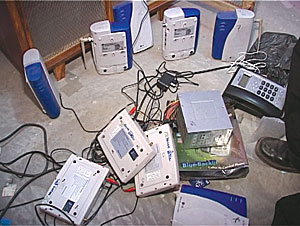 |
Callers are also cheated because the reception is unclear, it is hard to connect and services like fax are restricted. The way to tell is when you get a local number in the caller ID even though you're receiving an international call.
Telecom companies use satellite and optical fibre to connect international calls through circuit switch technology.
Call bypassers use V-SAT to divert international calls from the official gateway to Voice Over Internet Protocol (VOIP). The call is then transferred to the telecom client through a landline or mobile. Such international calls show local numbers on the receiver's set.
 |
Nepal Telecom has distributed 2.7 million SIM cards, Spice Nepal has distributed 1.7 million and UTL 122,000. Telecom companies estimate that about 10 per cent of these are used for bypass purposes. Surendra Prasad Thike, marketing manager at NTC says that in the last month over 6,000 SIM cards were blocked because they were used for bypassing calls. "We investigate as soon as we find anything suspicious," Thike says. But the NT hasn't done any proactive investigation to stop the telecom pirates.
The call bypass business is operated by an international network and thus has become difficult to control. Those arrested for bypassing calls are quickly freed. Staff involved in investigating calls often receive death threats. An NT official said, "We can't stop it just because we want to. The groups involved have organised political protection."


